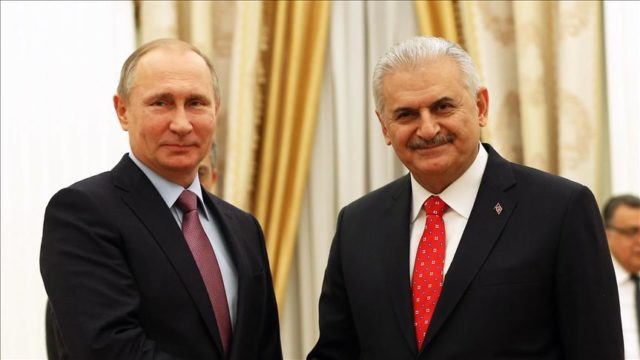
Are Russia and Turkey Mending Fences?
Publication: Eurasia Daily Monitor Volume: 13 Issue: 193
By:

Turkey’s Prime Minister Binali Yildirim paid a visit to Russia on December 6 and 7. Within the framework of the visit, Yildirim held talks with Russian President Vladimir Putin and Prime Minister Dmitry Medvedev in Moscow. Then he paid a visit to Tatarstan’s capital Kazan and attended the Turkish–Tatar Business Forum and the unveiling of a monument dedicated to Sadri Maksudi Arsal (AA, December 6–7).
The visit was mainly focused on economic relations, as a delegation of business people was accompanying Prime Minister Yildirim, along with some of his ministers. Hence, the agenda of the meetings included: lifting the embargo on exporting Turkish agricultural products to Russia, triggered by the 2015 crisis between Moscow and Ankara; removing the visa requirements for Turkish business people, boosting trade between the two countries, matters concerning the two countries’ currencies and the Russian-Turkish Joint Investment Fund. The Syrian crisis and military-diplomatic affairs between the two countries were also discussed during the meeting (Milliyet, December 4; Habertürk, December 5).
The Turkish and Russian presidents agreed to restore bilateral relations between their countries after Erdogan’s sent a letter to Putin on June 27, apologizing for the death of the Russian pilot whose plane was shot down by a Turkish F-16 in November 2015 (EDM, October 21). They subsequently met in St. Petersburg on August 9, then at the G-20 summit in Hangzhou in September, and again in Istanbul for the 23rd World Energy Congress in October 2016. Russia agreed to lift the embargo on Turkish agricultural products from January 2017. Although the ban was partially revoked earlier in 2016, fruit and vegetable products of strategic importance are still affected. Russia’s Agriculture Minister Alexander Tkachev indicated in his statement to Interfax that Russia is unlikely to completely lift restrictions on imports of Turkish agricultural products by the end of the year (Nezavisimaya gazeta, December 7). He pointed out insufficient food safety as the main reason for this decision. Vladimir Volik, Director of the State Service for Industrial Market Regulations, emphasized the necessity of holding on to the Turkish tomatoes import ban for another two to three years (NG, December 7).
Two important Russian energy projects—the Akkuyu nuclear power plant and the Turkish Stream natural gas project—received a further boost during Yildirim’s visit to Russia. According to the October 10 agreement between Russia and Turkey, the Turkish Stream natural gas project envisions the construction of two branches of the gas pipeline, with each delivering 15.75 bcm of gas. While one of the branches will supply the Turkish domestic market, the second one is scheduled to export natural gas to Europe (EDM, October 21). Before Yildirim’s visit to Russia, the Turkish Grand National Assembly ratified the Turkish Stream project on December 2, and President Erdogan signed the bill (Haber Rus, December 6). Thus, all obstacles to carrying out the project have been eliminated on the Turkish side. In the following months, the agenda of both countries will be to accelerate cooperation and dialogue with the EU in order to comply with the latter’s anti-monopoly policies on natural gas supplies and secure gas deliveries through Turkish Stream.
In another important aspect of energy cooperation, a dialogue was launched to solve problems for sustainability of the Akkuyu nuclear power plant project. The Turkish side stated that an agreement was reached with Russia on granting “strategic project status” to the Akkuyu project and its first unit would come online by the end of 2023 (Anadolu Ajansı, December 7).
Other subjects of discussion between the two countries were military-technical topics, but no agreement was reached on Turkey’s request to purchase Russian S-300 and S-400 for its air defense (İnterfax, December 7). Prime Minister Yildirim also held talks with his counterpart Dmitry Medvedev and President Putin on the Syrian crisis. However, no detailed statement was issued about the talks or a concrete agreement achieved on solving the conflict in Syria, an extremely serious problem for Ankara, which has already received millions of refugees (Sputnik December 7). Observers believe that the talks between Turkey and Russia on the Syrian crisis are the prerogative of Erdogan and Putin, while Yildirim was mainly focused on economic issues during his visit to Moscow.
An important development regarding the Syrian conflict was the Assad regime’s attack on Turkey during the operation launched by the Turkish Armed Forces on al-Bab in Syria on November 24, the one-year anniversary of the crisis in Russian-Turkish relations. Initially, some assumed that the attack was carried out by Moscow, but the subject was dropped after Russia’s Foreign Minister Sergey Lavrov’s stated that Russia was not involved in the attack (MİD, December 1). On the other hand, Moscow’s statement that Russia is holding talks with the Free Syrian Army (FSA) through Turkey has been a more recent development, which raises hopes that Russia’s Assad-centered policy might change. Turkey’s main priority in the Syrian crisis is to ensure the territorial integrity of the country, which Ankara says is impossible with Assad remaining in power. The emphasis on Syria was evident in Yildirim’s statement during his press conference in Moscow (İnterfax, December 7).
Bilateral relations between Turkey and Russia have not as yet been restored to the pre-crisis period. Official statements demonstrate that this process will take time and it is heavily dependent on developments in Syria. In addition, trust between the two countries has been seriously shaken during the Syrian conflict and will likely remain difficult to restore back to what relations were before the November 2015 downing of a Russian aircraft.



